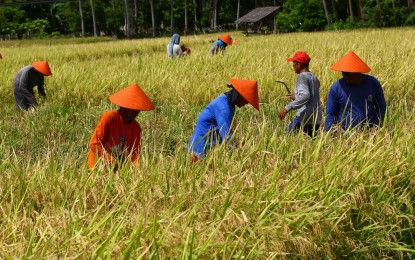Strengthening agri sector key to food security
- NewsDesk

- May 5, 2024
- 2 min read
By Komfie Manalo

FOOD PRODUCERS Farmers work in a ricefield in Barangay Hubangon, Mahinog, Camiguin. The Marcos administration is seeking to change the nation's agricultural landscape by encouraging more students to take agriculture courses, helping them become licensed agriculturists, and showing them that farming can be profitable. PNA
In a country where agriculture is perceived only as a means to subsist and relies on outdated technology, like carabao, hoe, and a hope for rain, farming is synonymous with poverty.
However, the Marcos administration is seeking to change the nation's agricultural landscape by encouraging more students to take agriculture courses, helping them become licensed agriculturists, and showing them that farming can be profitable.
At the signing of the memorandum of agreement (MOA) with the University of the Philippines Los Baños (UPLB) and 15 select state universities and colleges (SUCs), Commission on Higher Education (CHED) chairman J. Prospero de Vera III commented, "This is very crucial under the (President Ferdinand) Marcos Jr. administration because as you know, food security is a centerpiece initiative of this administration."
The MOA provides free online licensure examination reviews for agriculture graduates.
De Vera said the "Review and Strategy Program to Empower Students for Licensure Examination for Agriculturists" intends to encourage more enrollees to join the agricultural sector and help them pass the licensure examination.
De Vera added that this would also produce the next generation of farmers, with the current average age of farmers getting older.
"We have to make sure all of them become agriculturists. Because even if the enrollment and the passing rate goes down, then we cannot produce (agriculturists)," he said.
From 2019 to 2023, the country's average passing rate for the Licensure Examination for Agriculturists (LEA) was only 35.56 percent.De Vera said the initiative would also provide students a "cost-effective" opportunity, considering their typical high expenses and proximity challenges for licensure reviews.
"We are committed to this very significant activity, parang maliit lang pero napakalalim (It seems small, but it's far-reaching). We are committed to this because it's a matter of national survival," UP System President Angelo Jimenez said in a separate speech.
Under the MOA, the UPLB, a top-performing university in LEA, shall review other SUCs via online setup.
The review shall cover examination topics, such as soil science, agricultural economics, animal science, crop protection, crop science, and agricultural extension.
About 500 students are expected to benefit from the 340-hour review program from June 1 to Oct. 20.
Among the select SUCs are Basilan State College, Batanes State College, Capiz State University - Tapaz Campus, Isabela State University - Palanan Campus, Kalinga State University, Mindanao State University - Sulu Campus, North Eastern Mindanao State University - San Miguel Campus, Northwest Samar State University - San Jorge Campus, Quirino State University, Romblon State University - Cajidiocan Campus, Southern Luzon State University - Tayabas Campus, Sulu State College Tawi-Tawi Regional Agricultural College, University of Eastern Philippines - Catubig Campus, and the University of Rizal System - Tanay Campus.
These SUCs were chosen based on their LEA performance, geographical location, and the availability of computer laboratories with strong Internet connectivity.
Moving forward, the UP also expressed its willingness to help SUCs conduct reviews for students for the fisheries and forestry licensure examinations.



Comments